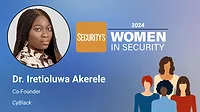Special Report
Candice Frost | Women in Security 2024
Director, Integrated DoD Account — Nightwing

CreativeDesignArt / DigitalVision Vectors / via Getty Images
Bio image courtesy of Frost
Military experience and mentorship can enhance a career in security
Candice Frost’s first steps into the security field happened when she was in high school. When in a conversation with her high school guidance counsellor, Frost was encouraged to pursue a future at The U.S. Military Academy at West Point.
“I was incredibly fortunate to be able to attend,” Frost says while reflecting on that experience. “And that's really what started the dive into the security field.”
Her fascination with the field led her to rise through the ranks of the military, living anywhere from New York to Arizona or Hawaii to Kentucky. She was involved with overseas deployments to Bosnia, spent two years of her life in Afghanistan, and most recently, spent the past seven years in Washington, D.C.
On her military career path, Frost says, “It's been a total blast. The career path has taken me from leading small units and airborne units where we jumped out of airplanes, all the way to working to create opportunities to collect great intelligence in forward deployed areas. It then moved me along to spaces where I was preparing General Milley for his chairmanship into the Joint Chiefs of Staff with the intel insights that I could give him. So, it's been a path I could never have predicted. It's been a wonderful, wild ride.”
Career transitions
With decades of military experience under her belt, Frost decided to venture down a new career path. She accepted an assignment to the United States Cyber Command as a Joint Intelligence Operations Center (JIOC) Commander. Here, Frost spearheaded the delivery of precise, timely and complete intelligence to U.S. Cyber Command. This pivot opened the door for her to take her first steps into the corporate cybersecurity world.
“I've told people I'm a fox with hedgehog tendencies, it really allows me to dive into areas where my insatiable curiosity takes me to different fields,” Frost says. “For example, for those in cyber, it really helps me to speak to a multitude of audiences. My engineering degree helps me speak to technical experts. My degree in public administration helps on Capitol Hill here. And my degree in security studies has allowed me to shape my military work for years. So, having those different perspectives truly has allowed me to almost shapeshift in different areas, but also has allowed me to speak to different audiences to really understand the criticality of the importance of cybersecurity.”
In addition to her career in cybersecurity, Frost also teaches as an Adjunct Professor at Georgetown University. There, she is involved with the university’s Security Studies Program, where she mentors the next generation of scholars, analysts and policymakers on national security, international security and foreign policy issues.
On her experiences as an instructor, Frost says, “I was very fortunate to be raised by a long lineage of teachers, and so teaching is 100 percent in my blood.”
From the military to the corporate world to universities, Frost has remained engaged with the field of cybersecurity.
“I think what I like most about the cyber field, especially in security, is that every day is a new adventure,” she says.
The value of character and mentorship on a security career
Frost shares her insights for those looking to dive into the field of cybersecurity, saying, “Don't think when you start out that you need every single certification — you have to start the journey itself. And there are so many free resources and courses that are available out there, you just have to begin. Don't get intimidated to think that you have to check every box — you just have to really dive in.”
She also emphasizes the importance of character and mentorship in one’s security career. In terms of mentorship, Frost advises individuals to seek someone with shared similarities in order to establish an early connection. She believes that the benefits a good mentor can provide for a person’s career cannot be discredited.
“In the field of real estate, the motto is location, location, location. And I use that akin to mentoring in the fact that it is connection, connection, connection,” Frost says. “And you would be amazed at how many times a mentor can open doors for you.”
Frost also believes there are qualities that prospective security leaders should foster within themselves. Two of the key qualities she emphasizes are patience and selflessness, as a career in security requires dedication and an ability to appreciate a mission that is larger than oneself.
She states that it’s never too late to change one’s career path. “You know, careers are not ladders, they're lattices,” Frost says. “And you can move from one side to the next. You don't always have to jump from rung to rung above you. Enjoy the ride.”
Looking for a reprint of this article?
From high-res PDFs to custom plaques, order your copy today!







